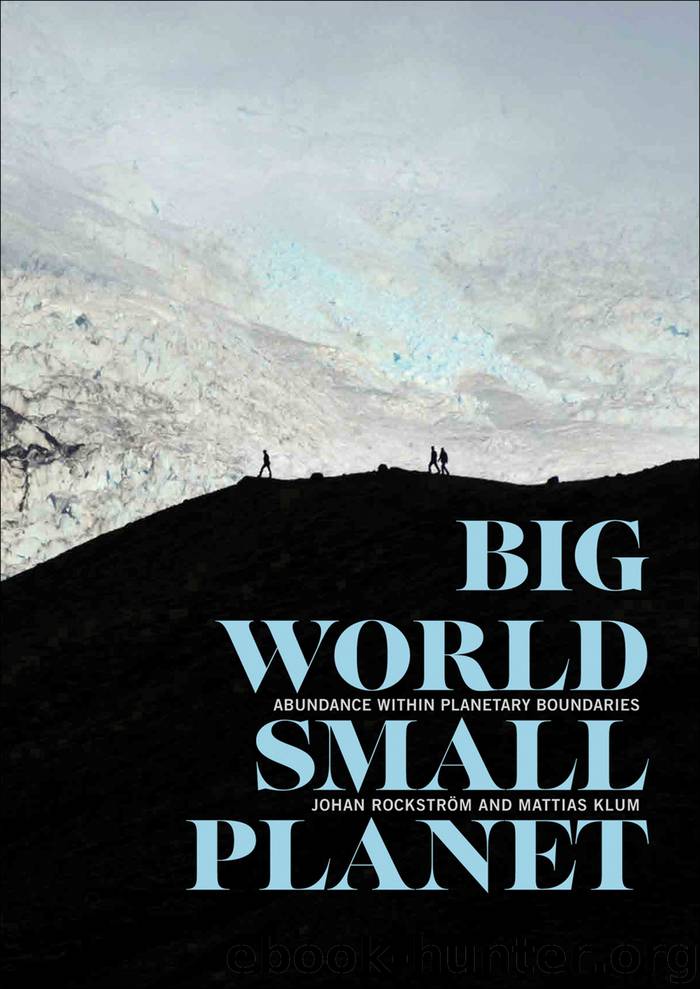Big World, Small Planet by Johan Rockström & Mattias Klum

Author:Johan Rockström & Mattias Klum
Language: eng
Format: epub
Publisher: Yale University Press
Published: 2015-08-19T16:00:00+00:00
Economic Benefits from Wise Management of Ecosystems
Wise management of ecosystems gives economic benefits. There are ample examples today showing that when we value, even at a conservative level, the role played by ecosystems in our economic activities, then sustainable practices and businesses are more profitable than unsustainable ones. Furthermore, sustainable management of ecosystems helps to build resilience, which forms an insurance capital in the face of various shocks. This is a key dimension of economic value.
This abrupt and irreversible collapse was a breakdown of an economic “fish-basket” worth an estimated 120 million USD in lost fish value (1989–1995) and several times more in lost incomes, ending a traditional way of life in many Newfoundland villages. More than 40,000 people lost their jobs. Similar collapses have followed in other marine systems around the world, including the Baltic Sea, where overfishing of cod and nutrient overload from cities and agriculture have turned large areas into dead zones.
Another example of human impact on the planet has come from the increased frequency of extreme weather events. Ever since we transgressed the planetary boundary for climate change—an atmospheric CO2 concentration level of 350 ppm— in the late 1980s, we’ve begun to see weather disasters such as heat waves, droughts, extreme downpours, and floods more often than we used to. In 2003, almost 40,000 Europeans died as a result of the worst heat wave ever recorded in the region, the largest environmental disaster to hit Europe in modern times. In Australia, a 12-year drought from 2000 to 2012 cost the nation an estimated 4 billion USD. In Pakistan, Afghanistan, Germany, and Thailand, massive floods displaced millions of people. When Hurricane Sandy in 2012 suddenly veered inland from its expected route in the Atlantic Ocean to strike New Jersey and New York, the storm surge put Wall Street 3 m (9.8 ft) under water and cost New York City a staggering 19 billion USD. In fact, the cost of natural disasters since the 1980s has been steadily rising, and true to the Anthropocene, it hasn’t been geological disasters such as earthquakes, tsunamis, or volcanic activity that have been happening more frequently, but rather climate events like heat waves, droughts, wildfires, floods, landslides, and big storms. Today, environmental disasters are estimated to cost the global economy more than 150 billion USD a year.
EARTH SUBSIDIZES WORLD ECONOMY
Another way to measure the economic impact of degrading our natural surroundings is to estimate what it would cost to replace the services we receive from them. Although we rarely consider this fact, Earth subsidizes economic growth to an astonishing degree. In fact, if you were to take into account the deterioration of social and natural capital as a cost of economic activities, many studies indicate that GDP-based growth would be significantly lowered, if not erased. Add up the cost of unsustainable use of ecosystems, natural resources, and the climate, and economic growth largely disappears in the USA, Germany, and China.
In the 2014 study by Robert Costanza and his colleagues, humanity lost ecosystem
Download
This site does not store any files on its server. We only index and link to content provided by other sites. Please contact the content providers to delete copyright contents if any and email us, we'll remove relevant links or contents immediately.
The Lonely City by Olivia Laing(4797)
Animal Frequency by Melissa Alvarez(4459)
All Creatures Great and Small by James Herriot(4306)
Walking by Henry David Thoreau(3950)
Exit West by Mohsin Hamid(3822)
Origin Story: A Big History of Everything by David Christian(3680)
COSMOS by Carl Sagan(3617)
How to Read Water: Clues and Patterns from Puddles to the Sea (Natural Navigation) by Tristan Gooley(3458)
Hedgerow by John Wright(3352)
How to Read Nature by Tristan Gooley(3332)
The Inner Life of Animals by Peter Wohlleben(3303)
How to Do Nothing by Jenny Odell(3292)
Project Animal Farm: An Accidental Journey into the Secret World of Farming and the Truth About Our Food by Sonia Faruqi(3212)
Origin Story by David Christian(3192)
Water by Ian Miller(3176)
A Forest Journey by John Perlin(3066)
The Plant Messiah by Carlos Magdalena(2924)
A Wilder Time by William E. Glassley(2855)
Forests: A Very Short Introduction by Jaboury Ghazoul(2836)
